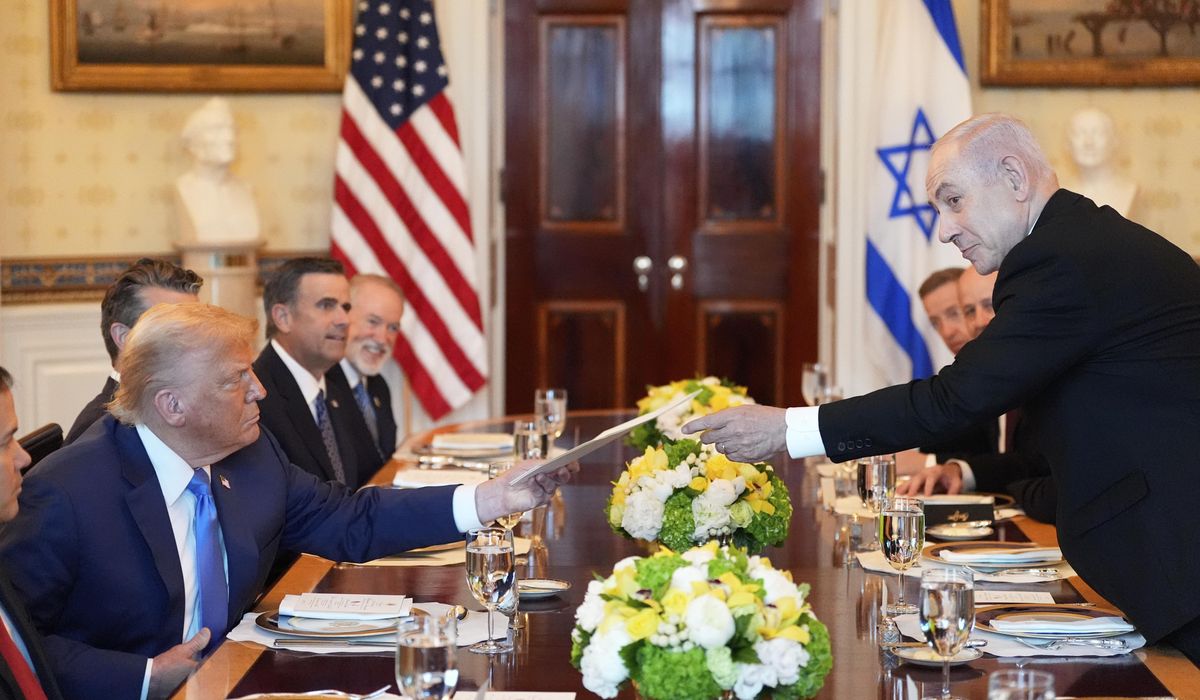ARTICLE AD BOX
JOHANNESBURG -- South Africa’s top law enforcement official said Friday that U.S. President Donald Trump wrongly claimed that a video he showed in the Oval Office was of burial sites for more than 1,000 white farmers and he “twisted” the facts to push a false narrative about mass killings of white people in his country.
Police Minister Senzo Mchunu was talking about a video clip that was played during the meeting between Trump and South African President Cyril Ramaphosa at the White House on Wednesday that showed an aerial view of a rural road with lines of white crosses erected on either side.
“Now this is very bad,” Trump said as he referred to the clip that was part of a longer video that was played in the meeting. “These are burial sites, right here. Burial sites, over a thousand, of white farmers, and those cars are lined up to pay love on a Sunday morning."
Mchunu said the crosses did not mark graves or burial sites, but were a temporary memorial put up in 2020 to protest the killings of all farmers across South Africa. They were put up during a funeral procession for a white couple who were killed in a robbery on their farm, Mchunu said.
A son of the couple who were killed and a local community member who took part in the procession also said the crosses do not represent burial sites and were taken down after the protest.
South Africa struggles with extremely high levels of violent crime, although farm killings make up a small percentage of the country's overall homicides. Both white and Black farmers are attacked, and sometimes killed, and the government has condemned the violence against both groups.
Whites make up around 7% of South Africa's 62 million people but generally still have a much better standard of living than the Black majority more than 30 years after the end of the apartheid system of racial segregation. Whites make up the majority of the country's wealthier commercial farmers.
Mchunu said Trump's false claims that the crosses represented more than 1,000 burial sites was part of his “genocide story” — referring to the U.S. president’s baseless allegations in recent weeks that there is a widespread campaign in South Africa to kill white farmers and take their land that he has said amounts to a genocide.
“They are not graves. They don’t represent graves,” Mchunu said regarding the video that has become prominent on social media since it was shown in the White House. “And it was unfortunate that those facts got twisted to fit a false narrative about crime in South Africa.”
“We have respect for the president of the United States,” Mchunu added. “But we have no respect for his genocide story whatsoever.”
The White House did not immediately respond to a request for comment about the South African official’s remarks.
Of the more than 5,700 homicides in South Africa from January through March, six occurred on farms and, of those, one victim was white, said Mchunu. “In principle, we do not categorize people by race, but in the context of claims of genocide of white people, we need to unpack the killings in this category,” he said.
Lourens Bosman, who is a former lawmaker in the national Parliament, said he took part in the procession shown in the video the Trump administration played. It happened near the town of Newcastle in the eastern province of KwaZulu-Natal in September 2020. The crosses were symbols to white and Black farmers and farmworkers who had been killed across South Africa over the previous 26 years, Bosman said.
Trump's falsehoods that South Africa's government is fueling the persecution and killing of its minority white farmers has been strongly denied by the country, which says the allegations are rooted in misinformation.
Ramaphosa pushed for this week's meeting with Trump in what he said was an attempt to change Trump's mind over South Africa and correct misconceptions about the country to rebuild ties.
Trump issued an executive order on Feb. 7 that cut all U.S. financial assistance to South Africa and accused it of mistreating white Afrikaner farmers and seizing their land. The order accused Ramaphosa's government of "fueling disproportionate violence against racially disfavored landowners."
Trump's executive order also accused South Africa of pursuing an anti-American foreign policy and specifically criticized its decision to launch a case at the International Court of Justice accusing U.S. ally Israel of genocide against Palestinians in Gaza. The order accused South Africa of supporting the Palestinian militant group Hamas through that case.
___
AP Africa news: https://apnews.com/hub/africa

 1 month ago
92
1 month ago
92








 English (US) ·
English (US) ·